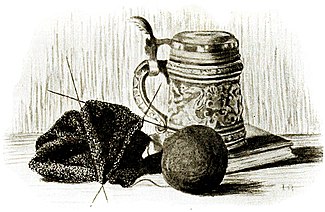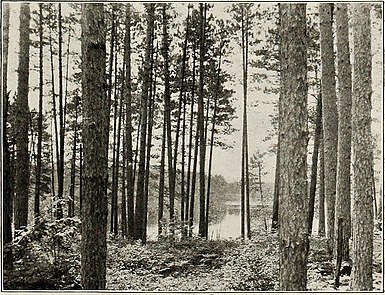THE HILLS OF JOY.
By Roy Randall (age 14.)
The Hills of Joy arise;
I saw their gleaming crystal crests
Clear cut the starry skies.
Were climbing joyously.
And one I called. who sweetly sang,
And he told this to me:
Forth from a world of sin,
And strong and sure must be the feet
Of him who walks therein.
Those fallen by the way,
And he must ever strive to do
His best from day to day.”
Of service freely given.
And when I stood upon the crest,
Lo! ’t was the Gate of Heaven.

“A Study from Still Life.” By Irma T. Diescher, age 16.
PLEASURE AND FUN.
By Marguerite Weed (age 13.)
Find the flag, red, white, and blue;
And the gun and sword and cannon,
Soldier-hat and knapsack, too;
Fix our tents up snug and fine:
Now, my men, I ’ll be your captain;
Stand here, quickly, in a line,
You can be lieutenant, Ted;
Jack, you be a wounded soldier:
Come, men, put him into bed,
At them, now, and make them run.
Oh, I say, this playing soldier
On George Washington’s birthday 's fun!

“Distance.” By Charles Ford Harding, Jr., age 14.
My Favorite Episode in French History.
By Dorthea Gay (age 16.)
During the winter of 1814-15 all France was in a fever of excitement and discontent. The emperor had abdicated and taken up his enforced residence on the island of Elba, and the royal power was held by a Bourbon, Louis XVIII. No one liked the new rule. It satisfied neither the Bonapartists nor the royalists by its policy. Napoleon himself had said: “The Bourbons will put France at peace with Europe, but how will they put her at peace with herself?” The lilies brought nothing with them but civil strife.
Meanwhile the exiled monarch kept himself posted upon affairs in Paris, and spent his time preparing the few ships and men left him for a sudden departure. On the twenty-sixth of February, knowing that the British vessel which acted as a spy on his movements had gone to Leghorn, he hastily embarked.
On the first of March he landed at Gulf Juan and began his famous march to Paris. At first no troops were sent against him, for Paris was not yet awake to the fact that he was really in France. As soon as they realized, however, that he was almost upon them, the Fifth Legion was sent to check his progress. Their former commander advanced to meet the men—alone.
“Soldiers of the Fifth,” he cried, “do you recognize me?”
“Yes, yes!” they eagerly replied.
“And is there a man among you,” he continued, “who would fire upon his emperor?”
This was too much; and rushing forward with shouts of “Vive l'Empereur!” they surrounded him, and throwing themselves upon him, embraced his feet in their enthusiasm of love and adoration.
This incident was only an example of what followed. The rest of the journey was one long triumphal procession. To send men against Napoleon was but to enlarge his forces. Marshal Ney was looked to as a last resort; but when he understood the situation, he yielded
to the force of circumstances and joined the invader. On